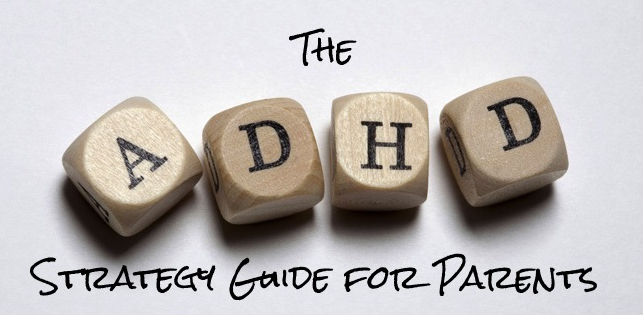
Why I Made This Guide
If your son or daughter has been diagnosed with Attention-Deficit/Hyperactivity Disorder (ADHD), odds are that you already have experienced some of the parenting challenges that come with it. Even more likely is your growing concern about your child’s ability to handle the necessities of life both now, and more importantly, in the future. In my time as a Marriage and Family Therapist specializing in treating adolescent and adult ADHD, I am consistently astonished at the lack of information parents are given about ADHD after their child has received the diagnosis. In an effort to properly equip parents, I created the following guide to serve as a quick reference on Attention-Deficit disorder. It is designed to address different aspects of conceptualizing and working with the disorder. I hope you find it to be an informative and useful tool to: (a) better understand your child, (b) develop creative ways of connecting with him/her, (c) avoid parental burnout, and (d) give your child the best chance to succeed academically, personally, and socially. The following is Part I: Understanding.
Managing Expectations
The first and possibly most important point I can emphasize to parents is that if your child has ADHD (especially if you do not) he or she probably does not think like you do. This goes beyond the simple differences that separate the priorities of adults and kids. We are talking about fundamentally different ways of mental processing, information absorption, and execution of behaviors. If these differences are ignored, misunderstood, or go unaccommodated, they can lead to a number of emotional issues and detrimental habits that can carry into adulthood. Understanding these differences and how kids express them is a crucial first step in helping them to thrive.
Attention Span
THE CHALLENGES
- Often very short capacity to maintain focus compared to their peers when it comes to things ADHD kids don’t like (e.g. homework, listening in class). Conversely, attention span can be seemingly infinite when it comes to things they do like (e.g. video games, watching YouTube).
- Easily distracted by visual and auditory stimuli (things they see and hear).
- Often have a difficult time prioritizing incoming information. Trying to have a conversation with them in a crowded or noisy room can be a challenge because the ADHD brain struggles to determine which information it picks up is most important.
- Prone to daydreaming or random thoughts that pop up and draw their attention elsewhere.
THE BENEFITS
- Propensity for creativity and invention as time spent daydreaming is when new ideas are formed.
- Being easily distracted by one’s environment isn’t always a bad thing. This can make teens hyper-aware of their surroundings, giving way to fast reflexes and heightened spacial awareness. This can be particularly useful when playing sports. Teens with ADHD may appear to be naturally gifted athletes.
- Teens with ADHD can be highly observant, as their distractibility makes them curious.
Disorganization
THE CHALLENGES
- Consistent difficulty with planning, organizing, and creating/maintaining structure or routine.
- Likely to find complex objectives that require multiple steps to be tedious and a challenge. There is a deficit in the ability to prioritize tasks, to think linearly, and to focus on both long and short-term goals at once. Therefore those with ADHD are prone to giving up such endeavors due to frustration.
- The ability to place events in order of sequence can be limited. This may manifest in a number of ways such as difficulty recounting the events of the day, or in telling a story.
- Are frequently unprepared for tasks, projects, or assignments that require significant planning.
THE BENEFITS
- Due to inherent difficulties with strategic planning and forward thinking, teens with ADHD often compensate in the only way they know how: to adapt.
- More likely to be flexible in the moment and successful on the fly, adapting to the necessities of the situation.
- ADHD kids may seem witty or clever as they can process rapidly in certain situations.
- Resourcefulness: without organizational skills, teens learn to recruit the help of others.
- Are often self-taught, preferring to learn from experience in the moment rather than reading a manual or text book.
Forgetfulness
THE CHALLENGES
- Due to shortened attention span and high distractibility, encoding information and memories is often more challenging.
- Can frequently lose or misplace personal items due to lack of attention and organizational skills.
- Likely to forget to do things that are not seen as instinctively important to them (e.g. chores, checking in with parents).
- May resort to lying about completing chores or homework that they forgot to do in order to avoid punishment or disappointment.
- Can be prone to interrupting others in conversation. This is due, in part, to thoughts or ideas coming quickly and the fear that their contributions can easily be forgotten if not shared immediately. It is also due to a lack of impulse control, which will be addressed later.
THE BENEFITS
- ADHD teens may be better able to let go of anger and frustration by moving on quickly.
- Teens develop a stronger sense of what is important to them as indicated by the things they choose to remember.
Pleasure Drive
THE CHALLENGES
- Extremely strong attraction toward excitement, activities that are pleasurable, or anything enjoyable or new.
- Likely to prioritize fun over obligations.
- May lie or be deceitful to get out of responsibilities in order to resume pleasurable activities.
- May require constant reinforcement, validation, or reward to see obligations as worthwhile.
THE BENEFITS
- Frequently seen as fun-loving by friends and family, the life of the party.
- Often regarded as charming.
- Can use creativity to find ways to make the mundane more exciting and interesting.
- Like to make others happy.
Impulsivity
THE CHALLENGES
- Those with ADHD are prone to low impulse control, which is the difficulty resisting sudden intense urges or desires that they feel must be met in order to avoid sadness, anxiety, or frustration.
- May suddenly blurt out words, thoughts, sounds, songs, etc…
- Behavior can often come across as rampant silliness or juvenile.
- Likely to act without thinking.
- Likely to be more reactive to their environment than their peers.
- Can develop a sudden desire or “wanting” of something, and can act out emotionally or aggressively if this desire is not met.
- Can be more susceptible to peer influence.
THE BENEFITS
- Impulsivity can take the form of spontaneity, leading to adventure.
- Less likely to “over-think” things, teens with ADHD are more likely to try new things and have new experiences.
- May demonstrate bravery, and are more likely to take risks.
- Like to joke and keep the mood light.
Frustration Tolerance
THE CHALLENGES
- Teens with ADHD often have a significantly lower frustration threshold than their peers.
- Likely to exhibit a strong resistance toward things that cause mental fatigue or frustration.
- May abandon interests or pursuits that they are not instantly good at or that suddenly become harder over time (e.g. school, sports, creative arts)
- Difficulty with things that require sustained mental effort.
- Can be emotionally explosive when efforts are not fruitful, are interrupted, or result in failure (e.g. throwing a tantrum when losing at a video game or team sport).
- Will frequently turn to pleasurable activities quickly when frustrated rather than work through challenges.
- Highly impatient, usually with themselves, likely due to unrealistic expectations of their abilities or of how rapidly a task should be completed or a skill learned.
THE BENEFITS
- Dramatic examples of frustration and emotional reactivity make it easier for parents and educators to identify when a teen with ADHD is struggling.
- Due to frequent frustration, teens with ADHD are more likely to know what soothes and calms them based on the activities they seek out when they reach the limits of their frustration.
Boredom with Routine
THE CHALLENGES
- Tendency to be easily bored correlates to the need for newness.
- May succeed for a period of time with routine when it is still “new,” but will frequently fall apart or intentionally deviate from routine when the “shine of newness” wears off, or if frustration sets in.
- May initiate conscious or unconscious efforts to sabotage routines just to break the perceived monotony.
- Require unique and evolving means of maintaining their interest.
THE BENEFITS
- To avoid boredom, teens with ADHD are more apt to find new and creative ways of doing something.
- Likely to employ and nurture skills of ingenuity.
- Able to find more than one way of solving a problem or completing a task. Can occasionally find a more efficient way through trial and error.
- As with impulsivity, boredom with routine leads to trying new things.
- Drawn to activities or interests that are unique or out of the norm.
- May seek professions as adults that involve what they “love to do” rather than those which merely pay the bills. This can lead to a more fulfilling work life.
Constantly Changing Interests
THE CHALLENGES
- Very common in those with ADHD due to a combination of the excitement drawn from new things/passions/endeavors and chronic abandonment of those very same things when they become challenging, routine, or frustration sets in.
- Likely to struggle with following through when it comes to pursuits.
- Many projects get started, few are seen through to completion.
- Prone to difficulty in one or more of the following areas: starting something, maintaining effort, or finishing something.
- Can be extremely confusing and frustrating for parents as ADHD kids may seem “all-in” with a passion or activity one minute, then “totally over it” the next.
THE BENEFITS
- Teens with ADHD can be natural problem solvers, finding quick resolutions to problems and moving on to the next issue before their focus/interests change.
- Frequently changing interests can provide ADHD teens with exposure to many different pursuits, giving them a larger pool of passions to draw from.
- Driven to variety, potentially expanding worldview and understanding others and their interests.
Achievement vs. Potential
- Those with ADHD often demonstrate intelligence, creativity, passion, and quick-wittedness, which suggest strong potential for success.
- Due to combinations of the cognitive processing/behavioral issues mentioned above, productivity and achievement are often far below what is seen as their potential.
- Performance may continue to drop precipitously due to chronic disappointment exhibited by family members, educators, and mentors because those with ADHD appear to be squandering their innate talents.
- Those with ADHD are often aware of their abilities and are just as bothered by their inconsistency as those around them, though this often goes unexpressed by teens.
- Secondary emotional symptoms often develop (e.g. depression, anxiety, anger) resulting from years of shame, living with disappointing others, peer rejection, and feeling misunderstood.
Part I Conclusion
It’s important to consider the mental and behavioral traits of adolescents with ADHD with an open mind. Not all teens necessarily exhibit these characteristics and not all have the same level of functionality. Many kids have developed “ADHD-like symptoms” where they demonstrate some of the behaviors above, but not enough to qualify for the full-blown clinical diagnosis. However, these teens struggle just as others do, and so we must address the symptoms they bear, regardless of their label. To do so, parents unfortunately must ask a lot of themselves regarding increasing their patience, mental flexibility, and by adapting their parenting style to meet the needs of their child. All of which will be outlined in PART II of the ADHD Strategy Guide for Parents, coming soon…

